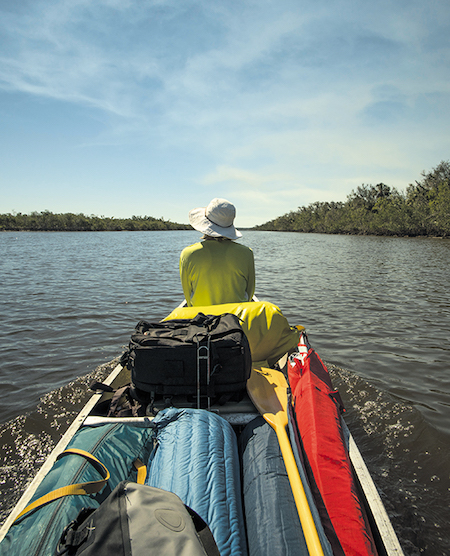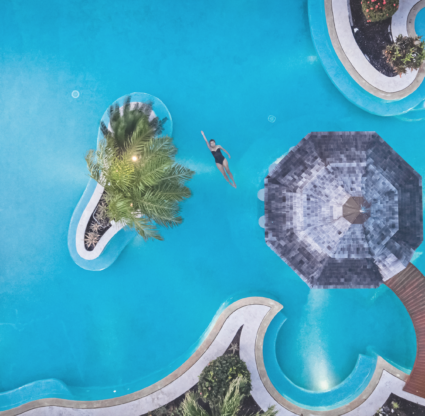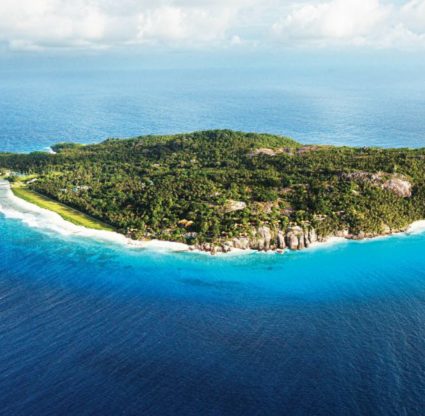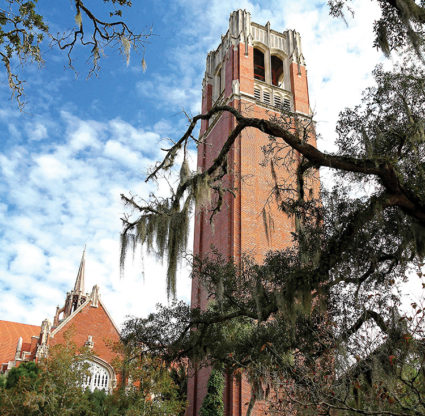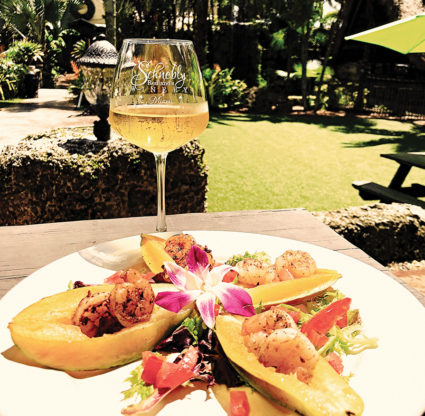I am a person who wears a checkered sunglass cord.
The intent is practical, the look lame, and to aggravate this fashion failing, my husband, Marc, is wearing a cord that matches mine. He bought them in a two-pack. This thought is flitting about in my head one Saturday as Marc steers toward the interstate from Estero en route to our annual camping pilgrimage to the Ten Thousand Islands.
8:41 a.m. An enormously awkward bird saunters into view. The vision is rare, we marvel, and point out the bird to our girls, 7 and 3, in the backseat. A turkey! They peer out from the ramparts of sleeping bags and mats, dry bags, a cooler, three cameras, a banana peel (circa 2006) and a neighbor kid. Then the turkey faces the swooshing cars, and surely its instincts will kick in because how can a turkey be so stupid, and yet—Thwack! Feathers scatter like the crescendo of a pillow fight. We are reminded that domesticated turkeys can’t fly as it hobbles to the median and presumably dies.
“A-hole!” I curse, inadvertently.
“Jerk!” the 7-year-old cries.
“The driver probably couldn’t see it,” Marc defends. “If the driver slowed down, that could have caused an accident.”
“Don’t mansplain the hitting of the turkey,” I grumble.
Our daughter’s wails grow as we turn toward my parents’ condo. “It says ‘Chicken Grill!’” she cries of the sight of her favorite restaurant. “Chicken is like turkey!”
To restore some balance, and because I don’t know how to describe random death in a way that will not ignite early onset existential dread, I suggest she could choose today not to eat chicken, precisely what my mother will later try to feed her. We drop off the kids to find balance of our own as I wonder if the macabre beginning to this trip could be some sort of omen in the form of fowl.
9:14 a.m. The Honda Element drifts toward oncoming traffic on U.S. 41 on the way to the Port of the Islands boat launch as my husband scans gullies for alligators. Distracting myself from nagging him about this, I read The New York Times book review of Time Pieces: A Dublin Memoir by John Banville. Reviewer Roger Rosenblatt talks of one of Banville’s preoccupations. “Childhood fascinates Banville because it’s ‘a state of constantly recurring astonishment.’ … ‘The process of growing up,’ he writes, ‘is, sadly, a process of turning the mysterious into the mundane.’”
This makes me almost as sad as the turkey that didn’t know to turn back.
9:57 a.m. “Is that a coyote? Or a panther?” My husband’s tone brightens as he spots a chestnut-colored creature roaming the roadside.
“Is it?” I look. “No. It’s a German shepherd.”
This interaction sums up why we are well-matched. He sees panthers in the mundane whereas I expect stray dogs. Often, in reality, it is the dogs we cross. I steel him for disappointment but believe one day it will be panther. Also, we are both practical enough to wear dorky sunglass cords when boating.
10:30 a.m. At the Port of the Islands marina, it costs $10 to park overnight, $4 a day to launch. Our destination: White Horse Key, a green blob on the map among other green blobs, with a sandy tip that looks like a pelican head. It sits beyond Dismal Key, where I’m grateful not to be staying. White settlers largely named these keys, where they lived and fished from larger islands in the late 1880s. Before them resided prehistoric indigenous populations, who were decimated by the diseases Spanish explorers brought with them. Only a few inhabitants remained by the 1940s as families decamped for Marco Island, Naples and Everglades City. These facts come courtesy of the U.S. Fish and Wildlife Service, keeper of the Ten Thousand Islands, a National Wildlife Refuge.
The canoe motor jolts to life and we zoom into the mangrove forests. I am reminded of one of my favorite sounds in the world: the dull chime of waves sloshing over shells clinging to mangrove roots. Though not a natural when writing about the outdoors, I rummage for creative magic to express what I see while studying the red mangroves, one of three mangrove species in the 35,000 acres of mangrove forests in the Ten Thousands Islands and part of the largest expanse of mangrove forest in North America. My thought process went something like this: Roots shellacked with shells. Shellacked and shells? Too much. What’s the word—Scalloped!! Scalloped shells. Ugh. Scalloped ruffles? Shells settle on mangrove roots like ruffled bloomers, I settle on and then discard. I have never known mangroves to wear bloomers.
12:38 p.m. We eat a lunch of prosciutto and Swiss sandwiches on the southern shore of White Horse Key as we scout for a camping spot. We traipse around gumbo limbo trees, limbs outstretched in devotion to a cloudless blue sky.
I consider the strawberries. “We should have brought cookies.”
“Oh, you didn’t bring cookies?” Marc is disappointed.
In a decade of doing these trips, we’ve seen the pall of poor food and drink planning. Early on, Marc selected a single box of raisins and nuts for provisions. We didn’t speak for hours. Other important lessons: More than one adult beverage is preferred, and always leave with several hours of daylight—seemingly obvious, but not immediately to us. Turns out, it’s not romantic paddling in the dark in a desolate wilderness as one of us (me) contemplates if we’d be able to locate the body of the other if something happened and one of us drowned or if we both would be lost to the sea.
The gumbo-limbo spot is nixed due to excess foliage, bait for mosquitoes and raccoons, camper enemies one and two. We paddle west around the island. Marco is in the distance, so I pull down the sides of my hat to block hints of civilization from my peripheral vision and focus on the birds: royal terns and blue heron perched on driftwood that sticks out of the water like a sea monster. The birds turn away from Marco, too.
2:10 p.m. Around the bend is a broad swath of soft white sand. This is it, we agree, and pitch the new tent in less than 20 minutes without argument, a cause for celebration. We clink beer bottles, stare at the water, and turn on the wireless speaker. Many keys do not have cell service. A Lumineers song shuffles into the mix, “Nobody knows how the story ends. Live the day, doing what you can.”
Marc is so relaxed he cannot form a sentence.
“I’m meeting…” he trails off.
I don’t bother asking him to finish it.
4:15 p.m. Marc is antsy to scout the neighboring keys for photos. We zip off in the canoe. Near the shoreline, there’s a scraping. A sputtering. A stopping. A silence. This is not uncommon from our used motor. Marc tries again. Nada. He declares the motor broken because we got too close to the oyster beds, and we both know “we” is “he.” It is unclear if it is broken for now or broken for good. White Horse Key looks far, but the Gulf offers a gift: four dolphins to entertain us on the paddle back.
4:45 p.m. The problem with claiming an uninhabited island is that then you have to defend it. Four small boats pull on shore. “Nothing says ‘private island’ like a dozen tourists,” Marc says, as invaders in shorts shoot selfies near our campsite.
5:40 p.m. A second group lands at the tip of what we’ve taken to calling “Our Island.” They are young, loud and sunburned. We stroll to the western side so we can’t see them and admire the glowing orange and pink sunset. There is something about staring at a vast unobstructed horizon that reminds me, in a good way, that I am but a speck in an infinite surge, one in a staggering flock of flightless turkeys.
6:30 p.m. Alone again. I pull out a paperback chosen specifically for its mindless quality. From the lullaby of lapping waves emerges a raspy gasp, snort-like.
Envisioning a wild hog, I bolt from my chair. “Marc?!”
A very un-porcine dolphin glides by.
“Nevermind!”
Stars begin to spackle the dark sky. Yet, the no-see-ums feel more potent than the celestial bliss and I plead for my husband to hurry with the fire. The necessity of cooking the burgers before sunset is a new add for our evolving list, we conclude, as sand crunches in our molars and the cheese falls into the fire.
10:30 p.m. A memory from TV: A psychotic clown pops out of nowhere in the woods. Gleefully, he gores a couple to death and makes the woman watch the dismemberment of the man. This vision stomps in my head as we settle in for the night. I reach for Marc’s attached hand and fall asleep.
7:24 a.m. Overnight, the water has been peeled back like an advent calendar to reveal treasures of the sea floor: driftwood sculptures, slick rocks, fossilized shells, skittering crabs. Just three days past the full moon, the tidal shift has pulled the water’s edge roughly a quarter-mile out from where it was night before.
Tides were once believed to be the “breath” of the earth, but this rising and falling of the seas is caused by the gravitational pull between the earth and sun. I let Marc explain the tidal forces, and I do not flag this as mansplaining. After all, he is a coastal engineer. Instant coffees in hand, we explore. Sand rippled from the waves is therapeutic to the toes. The shore is blanket for jellyfish plops, baby horseshoe crabs and lightning whelks. Black masses of oyster beds crackle and pop. The sand breathes. We gently dig our fingertips in to discover the source of the air holes. Emerald algae cling to rocks and shells. I bend to lace it through my fingers. It is soft. It soothes me.
This feels like astonishment. It is this I am here to seek. The Irish novelist’s words about childhood being “a state of constantly recurring astonishment” drift back. The prospect of this state that, yes, is harder to find in adulthood but still possible to spark or at least set the stage for is the pull of the Ten Thousand Islands. The setting is ripe: new keys to explore, tidal shifts to witness, mangrove huddles my words will forever fail to describe, and eroding shores and storm-toppled trees to mourn. Always, there are new mysteries to solve, or not, as the poetics of tides as breath feel preferable to gravitational facts. And you never know what mysteries will bubble up.
“I think your mom’s way of telling me I had BO was saying I smelled like onions,” my husband reflects on yesterday.
“It was probably because you just cut onions for the burgers.”
My husband’s conclusions about our trips are distinct from mine: “I just like to be in nature with no people.”
12:45 p.m. The tides have restored the water needed to leave Our Island. “The trip back is going to be challenging,” Marc says, assessing the white caps.
He notices my seat is broken and scavenges for wood to prop it up. He slams his Croc down on a log and breaks his sandal strap. He does the same thing with the other foot and breaks the sandal in exactly the same way.
Trip tally of broken things: a turkey, a motor and seat, Crocs, routine.
12:50 p.m. “I don’t think we could have better conditions,” Marc says, as the tide and crosswinds push along the canoe. His planning is deserving of gratitude because the paddle back is 10 miles.
“Perhaps if our motor hadn’t broken?” I needle him.
“Hey, don’t woman-put-me-down.”
We try, unsuccessfully, to come up with the female equivalent for “mansplaining.”
Later, a dolphin we chase leads us slightly off-course. It’s easy to get lost. The scenery repeats. Horizon. Island. Mangroves. Island. Gulf water. Brackish water. Mangroves. Water. Water. Water. Mangroves. Mangroves. The closer we get, the worse I feel, not due to the longing to stay in this wonderland but because our destination is on fire. Smoke casts a sheer sepia curtain to land and water, and the air smells of campfire and brine. In the east is an enormous plume of smoke, a controlled burn in the 78,000-acre Picayune State Forest that we later learn escaped control to the count of 10,000 acres days later. Every few minutes, I dab my burning eyes with wet tissue, which does nothing but slow us down. I paddle with my eyes shut, relying on marital trust because it seems that after two kids, 13 years and writing our own vows that I should entrust my husband to appropriately paddle a canoe. This presumption vanishes when Marc announces, “We’re going to collide.”
Three hours after leaving White Horse Key, around 4 p.m., we dock without collision, journey nearly complete. “Journey” is a word that makes me wince. Maybe it’s because of that trope: “Life is a journey, not a destination.” It’s too much pressure. As if it were so easy to recast the shifts and letdowns of life. Yet, even though the idea feels Pollyanna, I try. But sometimes you need to escape your world to feel this trope can be true. This particular day it is all about the journey because at the smoke-filled destination I contemplate blindness. Eyes in teary slits, I grope my way to the marina store’s freezer case to find Ben & Jerry’s. I eat ice cream, blind, as the earth burns.

